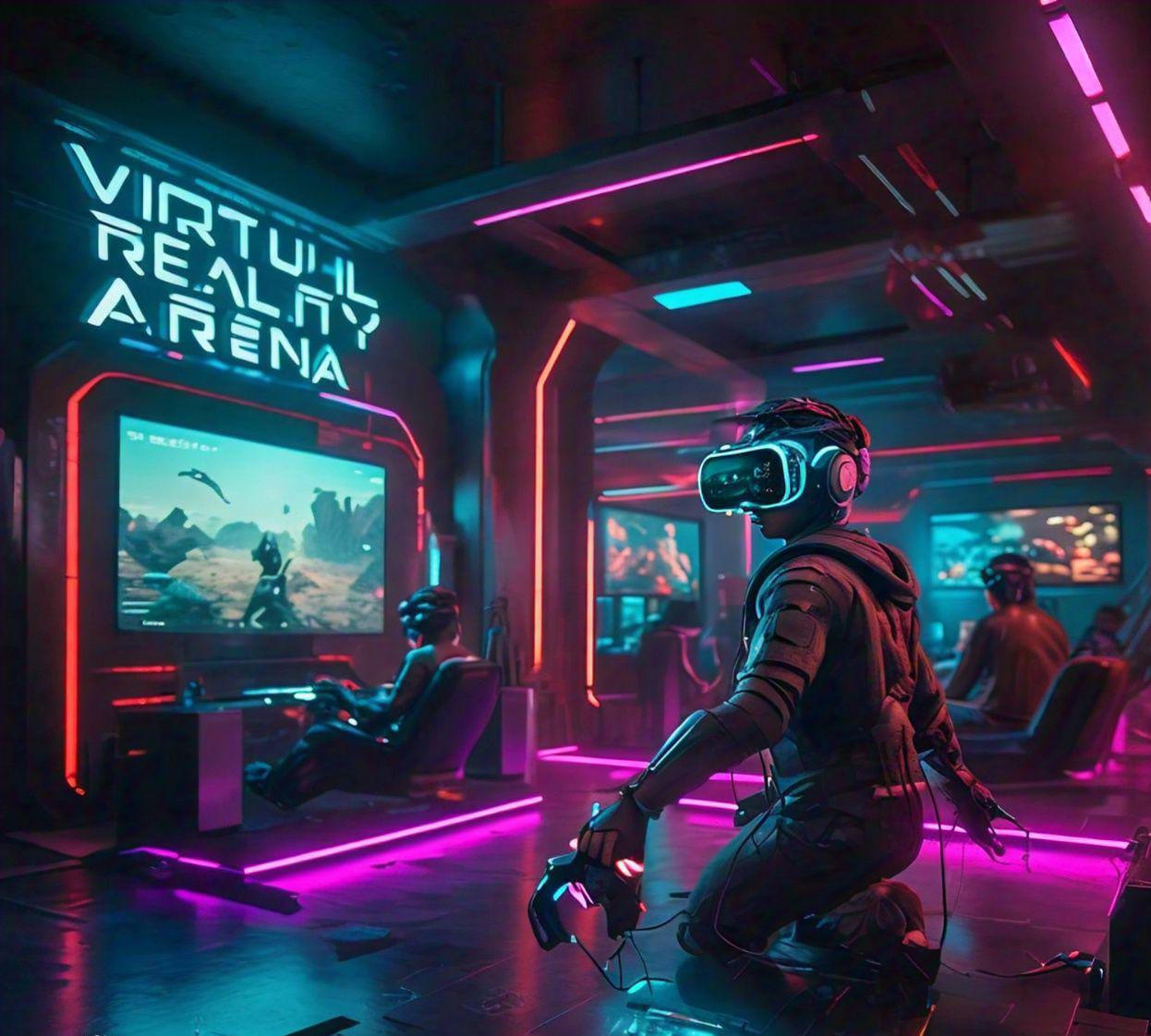Outline of the Article
- Introduction
- The Rise of Virtual Reality (VR)
- importance of VR in Modern Gaming and Entertainment
- Understanding Virtual Reality (VR)
- What is VR?
- How VR Works
- VR in Gaming
- Evolution of Gaming with VR
- Popular VR Gaming Platforms
- PlayStation VR
- Oculus Rift
- HTC Vive
- Top VR Games of All Time
- Immersive Experience in VR Gaming
- Enhancing Gameplay
- Physical Interaction and Motion Tracking
- Multiplayer VR Games
- VR in Entertainment: Beyond Gaming
- VR in Movies and TV Shows
- VR in Live Events
- Virtual Reality Theme Parks
- The Technology Behind VR
- Hardware Components
- Software and Game Development
- VR Accessories
- Benefits of VR in Gaming and Entertainment
- Enhanced User Experience
- Increased Engagement
- New Creative Opportunities
- Challenges and Limitations of VR
- High Costs
- Technical Issues
- Health Concerns
- VR’s Role in Entertainment and Gaming
- Advancements in VR Technology
- Potential Market Growth
- Future Trends and Predictions
- Conclusion
- Summary of Key Points
- The Continuing Evolution of VR
- FAQs
- What is VR?
- How does VR enhance gaming experiences?
- Are there any health risks associated with VR?
- What are some popular VR gaming platforms?
- How is VR used in other forms of entertainment?
Virtual Reality in Gaming and Entertainment: A New Immersion Era
Virtual Reality (VR) has swiftly emerged as a transformative force in the realms of gaming and entertainment. This immersive technology has not only changed the way we play games but also how we experience movies, live events, and theme parks. Let’s dive into the fascinating world of VR and explore its impact on gaming and entertainment.
Understanding Virtual Reality (VR)
What is VR? Through the use of a computer-generated simulation, people may interact with a three-dimensional world in virtual reality. This simulated environment can be similar to or completely different from the real world, offering a unique experience where the boundaries of reality blur.
How VR Works VR works by combining hardware and software to create immersive experiences. Users wear VR headsets that display images and sounds from the virtual environment. Sensors track the user’s movements, allowing for interaction within this simulated world.
VR in Gaming
Evolution of Gaming with VR The gaming industry has always been at the forefront of technological advancements, and VR is no exception. From the early days of basic graphics and simple gameplay, we now have games that offer lifelike experiences through VR. The evolution of VR in gaming has brought about a more engaging and interactive form of entertainment.
Popular VR Gaming Platforms
- PlayStation VR: Sony’s PlayStation VR has been a major player in the VR market, providing an accessible entry point for console gamers.
- Oculus Rift: Developed by Oculus VR, this headset is known for its high-quality visuals and wide range of compatible games.
- HTC Vive: HTC Vive offers room-scale VR, allowing users to move around and interact with the virtual environment more freely.
Top VR Games of All Time Some standout VR games have set the standard for what this technology can achieve. Titles like “Half-Life: Alyx,” “Beat Saber,” and “The Elder Scrolls V: Skyrim VR” have captivated players with their immersive gameplay and stunning visuals.
Immersive Experience in VR Gaming
Enhancing Gameplay VR gaming elevates the player’s experience by placing them directly into the game’s world. This level of immersion makes gameplay more engaging and realistic.
Physical Interaction and Motion Tracking One of the key aspects of VR gaming is the ability to physically interact with the game environment. Motion tracking technology allows players to use their hands and bodies to control their in-game avatars, creating a more dynamic and interactive experience.
Multiplayer VR games also bring a new dimension to multiplayer gaming. Players can now meet in virtual spaces, collaborate, and compete in ways that were previously impossible. Games like “VRChat” and “Rec Room” have popularized social interaction in virtual environments.
VR in Entertainment: Beyond Gaming
VR in Movies and TV Shows Beyond gaming, VR is making waves in the film and television industry. Filmmakers are exploring VR to create immersive storytelling experiences that place viewers at the heart of the action. Imagine watching a movie where you can look around and explore the scenes from different angles!
VR in Live Events Live events such as concerts, sports, and theater performances are also being transformed by VR. With VR headsets, fans can experience these events as if they were physically present, offering a level of engagement that traditional broadcasts cannot match.
Virtual Reality Theme Parks Theme parks have begun to incorporate VR to create thrilling new attractions. These virtual rides and experiences offer a blend of physical and digital elements, providing visitors with adventures that are out of this world.
The Technology Behind VR
Hardware Components The core of any VR system includes a headset, motion sensors, and controllers. High-resolution displays and advanced optics are essential for creating realistic visuals, while sensors track head and body movements.
Software and Game Development Developing for VR requires specialized software and game engines capable of rendering immersive environments. Tools like Unity and Unreal Engine are commonly used by developers to create VR content.
VR Accessories To enhance the VR experience, various accessories are available. These include motion controllers, haptic feedback devices, and even treadmills that allow for 360-degree movement.
Benefits of VR in Gaming and Entertainment
Enhanced User Experience VR offers a level of immersion that traditional gaming and entertainment mediums cannot match. This heightened sense of presence makes experiences more memorable and impactful.
Increased Engagement Interactive VR experiences keep users engaged for longer periods. The ability to explore and interact with virtual environments leads to a deeper level of involvement.
New Creative Opportunities VR opens up new avenues for creativity. Game designers, filmmakers, and event organizers can experiment with innovative ways to tell stories and entertain audiences.
Challenges and Limitations of VR
High Costs The expense is one of the main obstacles to the broad adoption of VR.High-quality VR systems can be expensive, making them less accessible to the average consumer.
Technical Issues VR technology is still evolving, and issues such as motion sickness, latency, and limited content can detract from the experience. Developers are always trying to solve these problems.
Health Concerns Extended use of VR can lead to physical discomfort, such as eye strain and dizziness. It’s important for users to take breaks and use the technology responsibly.
VR’s Role in Entertainment and Gaming
Advancements in VR Technology As technology continues to advance, we can expect even more realistic and immersive VR experiences. Improvements in hardware, such as lighter headsets and better graphics, will enhance the overall experience.
Potential Market Growth The VR market is poised for significant growth. As prices decrease and technology improves, VR will become more accessible, leading to broader adoption.
Future Trends and Predictions Future trends in VR include the integration of augmented reality (AR), more social VR platforms, and the development of new content genres. The possibilities are virtually limitless as virtual reality technology advances.
Conclusion
Virtual Reality is revolutionizing the gaming and entertainment industries by offering immersive, interactive experiences that were once the stuff of science fiction. As technology advances, the potential for VR continues to grow, promising exciting developments in the years to come.
FAQs
What is VR? VR, or virtual reality, is a technology that creates a simulated environment, allowing users to interact with it through special headsets and sensors.
How does VR enhance gaming experiences? VR enhances gaming by providing immersive experiences where players feel like they are inside the game world, offering more realistic interactions and engagement.
Are there any health risks associated with VR? Extended use of VR can cause eye strain, dizziness, and motion sickness. It’s important to take regular breaks and use VR responsibly.
What are some popular VR gaming platforms? Popular VR gaming platforms include PlayStation VR, Oculus Rift, and HTC Vive.
How is VR used in other forms of entertainment? VR is used in movies, live events, and theme parks to create immersive experiences that engage audiences in new and exciting ways.








